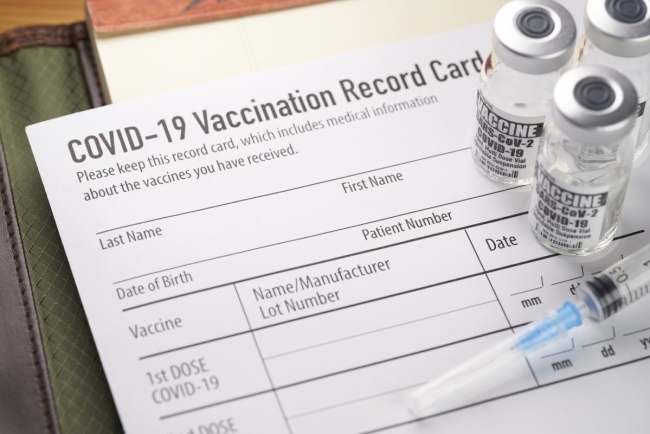You have /5 articles left.
Sign up for a free account or log in.

Bill Oxford/iStock/Getty Images Plus
Back in July, administrators at Stockton University in New Jersey were worried about compliance with the institution’s COVID-19 vaccine requirement. Only about a third of students had submitted proof of vaccination or a request for an exemption as of about two weeks prior to an Aug. 1 deadline, and Susan Davenport, Stockton’s executive vice president and chief of staff, wondered aloud whether students were waiting the university out to see if the mandate would stick.
It did. Stockton, a public university, reports strong compliance with its requirement. Out of the university’s 9,378 students, just 156 did not either submit for an exemption or get vaccinated and were disenrolled as a consequence. Of that group, 58 re-registered, either after getting vaccinated or obtaining an exemption.
About 12 percent of Stockton’s students received exemptions on religious or medical grounds.
“We were so nervous back in July,” Davenport said. “Once we started a very serious all-hands-on-deck communications campaign, the students realized we meant it. A lot of them were vaccinated but hadn’t uploaded their vaccination, and some were vaccine reluctant and having to take the vaccination to go back to school helped them make the decision to be vaccinated.”
Many of the approximately 1,000 colleges that have mandated COVID-19 vaccines are reporting strong compliance with the requirements, even as they differ in the approaches they’re taking toward those lagging students who have not complied by the relevant deadlines. Some have disenrolled students from their fall classes if they do not meet the requirement, while others are extending a grace period for the fall as long as unvaccinated students submit to extra COVID-19 safety protocols such as surveillance testing.
At the University of New Mexico, students have until Sept. 30 to submit proof of vaccination. If they don’t meet that deadline, they can remain enrolled for the fall term so long as they submit to a weekly COVID-19 testing requirement, but the university will place a hold on their accounts preventing them from registering for classes in the spring, according to James Paul Holloway, UNM’s provost and executive vice president for academic affairs.
Holloway said it was a difficult choice whether to disenroll students for the fall, and that the university might have made a different decision if it had announced its vaccination requirement earlier in the summer, rather than in August, when it did. “We know the consequences to many of our students, many of whom are first-generation college students, a vulnerable student population -- if we disenroll them in the middle of the term, they will probably disappear from higher ed and never come back,” Holloway said. “So when Oct. 1 rolls around, we wanted them to have the ability to remain safely on campus by electing to be tested and have the rest of the fall term to arrange transfer to another institution if that was their choice.”
Leading up to the Sept. 30 deadline, about 70 percent of students at UNM’s main campus at Albuquerque have been confirmed as vaccinated. The number is lower at the branch campuses -- at the Los Alamos campus, for example, it’s around 61 percent -- though Holloway said the university knows from state health department data that the percentage of students at the Los Alamos campus who are fully vaccinated is at least 73 percent (the university can’t match the health department data to individual students without students’ permission, which is why it still needs students to report their own vaccination status).
“We really do have more work to do in getting more of the students in the branch campuses to report,” Holloway said. “The total numbers of students at any of these branch campuses are not particularly big, so they can talk with them individually. We’re also emailing those students and texting them to encourage them to report. Every day more do so.”
Many see vaccination mandates as the best way for colleges to protect student and employee safety and return to relatively normal operations. Colleges without mandates -- located in different geographical regions -- include Pennsylvania State University, which as of Monday reported a 67 percent student vaccination rate and an 80.2 percent employee vaccination rate across all its campuses, and the University of Alabama, which reported that at least 61 percent of students and 73 percent of employees had received at least one dose of a vaccine at its main campus in Tuscaloosa. The rate was lower at the Huntsville campus: 49 percent for students and 68 percent for employees.
Louisiana State University, which announced a COVID-19 vaccine mandate for students and employees late, on Aug. 24, said on Sept. 15 that with nearly all students reporting, more than 82 percent provided proof of vaccination. More than 72 percent of faculty and staff reported being fully vaccinated.
“If you had asked me that two months ago whether this was imaginable, I would have said no,” LSU president William F. Tate IV said of the student vaccination rate. “This is no less than incredible, particularly in a state where less than half of the people are vaccinated.”
Some colleges with vaccination mandates are reporting they’ve reached more than 90 percent vaccination rates for students and employees. A recent paper by Yale School of Public Health researchers published in the Annals of Internal Medicine found that campuses that achieve vaccination rates of more than 90 percent “can insulate themselves against most of the threats that will otherwise prompt widespread or frequent testing and a return to more intensive or disruptive” nonpharmaceutical interventions.
Among institutions with vaccination rates in that threshold, the Berklee School of Music in Boston reports that 95.8 percent of all Boston-based students, faculty and staff are fully inoculated. Hartwick College in Oneonta, N.Y., reports that 94 percent of students, and 100 percent of faculty and staff working on campus, are vaccinated. The University of Scranton, a Jesuit institution in Pennsylvania, reports that more than 96 percent of students, faculty and staff on campus this fall are fully vaccinated.
Robert W. Davis Jr., vice president for student life at Scranton, attributed the high compliance among students largely to students’ care for the community and their desire to get campus life back to normal. “You never know when you make a decision like this how people are going to react,” Davis said. “The way people have rallied behind the idea of coming together as a community has really been inspiring.”
McDaniel College, a liberal arts college in Maryland, similarly reports 94 percent of students are fully vaccinated and 1 percent partially vaccinated, with another 5 percent of students having obtained an approved exemption. A college spokeswoman, Cheryl Knauer, said five students did not comply, and all chose to take a leave of absence.
“We are proud of the way our students have responded and of their continued commitment to following the protocols put in place for the health and safety of one another,” Knauer said.
At Delaware State University, a historically Black institution, all students on campus have complied with the vaccination policy, either by getting vaccinated -- 2,660 students are fully vaccinated, and 276 are partially vaccinated as of Sept. 15 -- or obtaining an exemption (216 students), according to Steve Newton, a university spokesman. Newton said the university didn’t allow residential students to check into housing until they either provided documentation of vaccination or an approved exemption.
“To my knowledge we have not disenrolled or locked out any students from noncompliance; a number of students have chosen to attend digitally during this semester,” Newton said.
Allegheny College, a liberal arts college in Pennsylvania, also did not allow students to move into their campus housing if they hadn’t met the requirement; two students who arrived unvaccinated had to stay at hotels while they got their first shot and a COVID-19 test. Josh Tysiachney, an Allegheny spokesman, said 1,532 students submitted proof of full vaccination. The college approved 34 student requests for exemptions: of that group of 34, six students did not come to campus, electing to withdraw or take a leave of absence, and four opted to get vaccinated after all.
At the University of Colorado Boulder, which had a deadline of Sept. 15 for students and employees to meet the COVID-19 vaccination requirement, about 4,000 students out of almost 36,000 have not yet completed the reporting requirement, according to a university dashboard. (Of those who have reported, 95 percent are vaccinated.)
A Boulder spokeswoman, Melanie Marquez Parra, said that submissions are still being processed for about 1,000 students “and we continue to follow up with students who have not yet submitted vaccine information.” She said students who do not submit vaccine information will be assessed a fee of $25 and a hold will be placed on their spring registration.
Cabrini University, a Roman Catholic institution in Pennsylvania, reports that 90.9 percent of residential students and 95.4 percent of employees are fully or partially vaccinated -- but 429 students, mostly graduate and online students, have not yet completed the requirement, according to Dean of Students Stephen Rupprecht. “The university has sent notice to those students who are registered for in-person classes that their course registration is in jeopardy of being dropped and that they will be banned from campus if they are not in compliance,” Rupprecht said.
Other colleges are also sending warning messages, saying they mean business.
Virginia Commonwealth University, which as of Monday reported 97.8 percent student compliance and 98.3 percent employee compliance with its vaccine mandate, issued a universitywide memo Sept. 3 outlining penalties for noncompliance. As the memo outlines, noncompliant students would continue to be subject to a registration hold, which limits their ability to make changes to their schedule, prevents them from registering for spring classes and requires them to report for surveillance testing. Employees who fail to certify their vaccination status or request an exemption by Oct. 1 would be subject to termination.
“Our approach to addressing noncompliance with vaccination requirements is to be fair and equitable, while also holding students and employees accountable for their role in supporting a healthy campus environment,” said Michael Porter, a VCU spokesman. He said that as of Monday, 531 students out of 27,316 have holds on their registration preventing spring registration and requiring them to report for the weekly COVID-19 surveillance testing.
“Failure to report for surveillance testing will result in administrative withdrawal -- students who fail to show for testing receive a warning the first week and, if they fail to show for a second week, they will be withdrawn from classes,” Porter said.
Sacramento State University, which set a deadline of Sept. 13 for students to meet a requirement to certify their vaccination status, request an exemption or certify that they would not come to campus, similarly sent a message last week to 4,306 students -- about 13 percent of the student population -- who did not meet the deadline to tell them they were barred from campus and would be disenrolled from in-person classes if they did not complete the requirement by Sept. 27. The university said that after the message went out another 2,100 students completed the certification process.
Sacramento State reports that as of Sept. 14 -- the most recent date for which data are available -- 81 percent of students were vaccinated, 8 percent pledged not to come to campus, 3 percent claimed a religious exemption and 0.06 percent claimed a medical exemption.
Seven percent -- 2,206 students -- had yet to certify their status.








